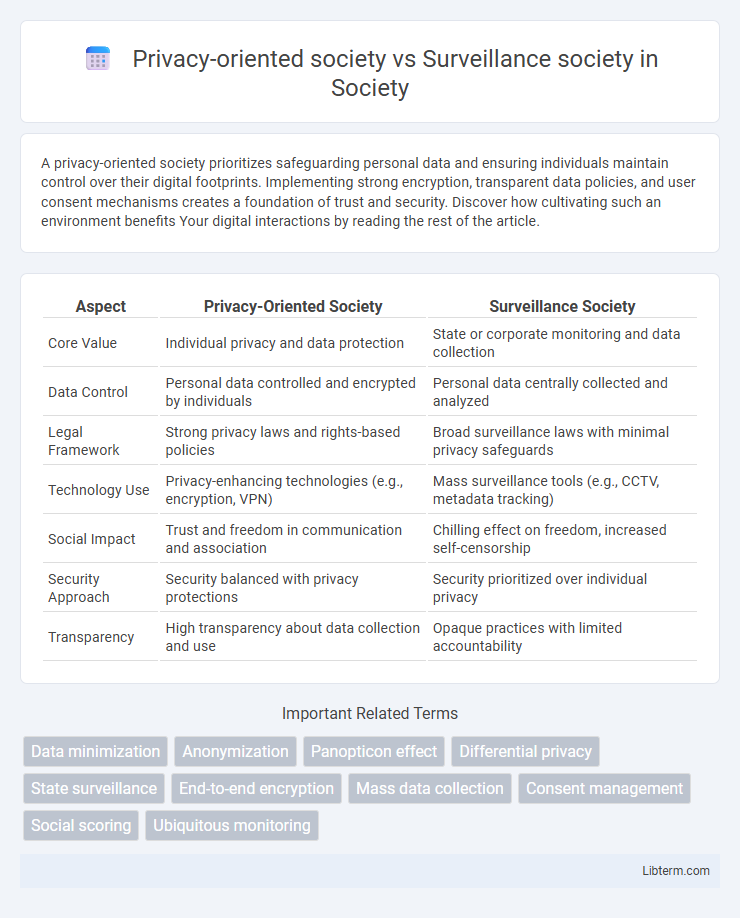A privacy-oriented society prioritizes safeguarding personal data and ensuring individuals maintain control over their digital footprints. Implementing strong encryption, transparent data policies, and user consent mechanisms creates a foundation of trust and security. Discover how cultivating such an environment benefits Your digital interactions by reading the rest of the article.
Table of Comparison
| Aspect | Privacy-Oriented Society | Surveillance Society |
|---|---|---|
| Core Value | Individual privacy and data protection | State or corporate monitoring and data collection |
| Data Control | Personal data controlled and encrypted by individuals | Personal data centrally collected and analyzed |
| Legal Framework | Strong privacy laws and rights-based policies | Broad surveillance laws with minimal privacy safeguards |
| Technology Use | Privacy-enhancing technologies (e.g., encryption, VPN) | Mass surveillance tools (e.g., CCTV, metadata tracking) |
| Social Impact | Trust and freedom in communication and association | Chilling effect on freedom, increased self-censorship |
| Security Approach | Security balanced with privacy protections | Security prioritized over individual privacy |
| Transparency | High transparency about data collection and use | Opaque practices with limited accountability |
Understanding Privacy-Oriented Societies
Privacy-oriented societies prioritize individual rights by implementing robust data protection laws and empowering citizens to control personal information. These societies emphasize encryption technologies, transparent surveillance oversight, and citizen consent to maintain trust and prevent abuse of power. Strong legal frameworks like the GDPR and active civil rights organizations define privacy-oriented models, promoting a balance between security and freedom.
Defining Surveillance Societies
Surveillance societies prioritize systematic monitoring and data collection to control and influence individual behavior, often employing extensive digital technologies such as CCTV, biometric systems, and online activity tracking. These societies emphasize state or corporate power consolidation through constant observation, raising concerns about privacy erosion and civil liberties infringement. Defining surveillance societies involves analyzing the balance between security measures and personal freedoms within the frameworks of governance, technology, and societal norms.
Historical Evolution of Privacy and Surveillance
The historical evolution of privacy and surveillance reveals a shift from small-scale, face-to-face community oversight to complex, state-sponsored monitoring enabled by technological advancements like photography, telegraphs, and the internet. Surveillance societies have expanded since the 19th century with the rise of centralized governments and mass communication tools, enabling widespread data collection and control. In contrast, privacy-oriented societies advocate for legal frameworks such as the GDPR and constitutional rights that protect individuals from pervasive surveillance and promote data minimization and transparency.
Key Principles of a Privacy-Oriented Society
A privacy-oriented society upholds principles such as data minimization, user consent, and strong encryption to protect individual freedoms and prevent unauthorized access. Emphasizing transparency, accountability, and the right to anonymity, it seeks to empower citizens with control over their personal information. This approach contrasts sharply with surveillance societies, where pervasive monitoring undermines trust and erodes civil liberties.
Core Characteristics of a Surveillance Society
A surveillance society is characterized by pervasive monitoring, where government and private entities collect, analyze, and store vast amounts of personal data using technologies like CCTV, facial recognition, and data mining. This environment often results in restricted privacy, increased social control, and potential abuses of power due to constant observation and lack of transparency. Unlike a privacy-oriented society, where individual rights and data protection are prioritized, surveillance societies emphasize security and social order often at the expense of civil liberties.
Impacts on Civil Liberties and Human Rights
Privacy-oriented societies prioritize individual autonomy, ensuring robust protections for civil liberties such as freedom of expression, assembly, and protection against unlawful searches. In contrast, surveillance societies often justify expansive monitoring measures by citing security concerns, which can erode fundamental human rights and enable state overreach. The tension between privacy and surveillance fundamentally shapes the balance between state power and personal freedoms in democratic governance.
Technological Advancements Shaping Both Societies
Technological advancements such as end-to-end encryption, decentralized networks, and privacy-preserving algorithms empower privacy-oriented societies by safeguarding personal data and promoting user autonomy. In contrast, surveillance societies leverage technologies like facial recognition, big data analytics, and ubiquitous IoT sensors to monitor and control populations at scale. The tension between these technological trajectories highlights the ongoing conflict between individual privacy rights and state or corporate surveillance capabilities.
Social Trust and Community Well-being
Privacy-oriented societies foster higher levels of social trust by protecting individual freedoms and promoting transparent interactions, which enhances community well-being through stronger social cohesion. Surveillance societies often undermine social trust as pervasive monitoring creates feelings of suspicion and fear, leading to weakened community bonds and reduced collective resilience. Empirical studies indicate that safeguarding privacy correlates with increased civic engagement and psychological well-being, reinforcing the importance of privacy in sustaining healthy communities.
Policy Approaches: Safeguarding Privacy vs. Enhancing Security
Policy approaches in privacy-oriented societies prioritize robust data protection laws, enforcing strict regulations on data collection and usage to safeguard individual privacy rights. In contrast, surveillance societies emphasize expansive government monitoring powers and mass data accumulation aimed at enhancing national security and crime prevention. Balancing these approaches requires nuanced legislation that protects civil liberties without compromising public safety through excessive surveillance.
Future Trends: Toward a Balanced Digital Society
Future trends indicate a growing emphasis on developing privacy-enhancing technologies such as decentralized identity systems, homomorphic encryption, and zero-knowledge proofs to empower individuals while maintaining security. Governments and corporations are increasingly pressured to adopt transparent data governance frameworks and enforce stricter regulations like the GDPR and CCPA to prevent mass surveillance abuses. The evolution toward a balanced digital society hinges on integrating ethical AI, privacy-by-design principles, and robust cybersecurity measures to harmonize data utility with individual rights.
Privacy-oriented society Infographic

 libterm.com
libterm.com